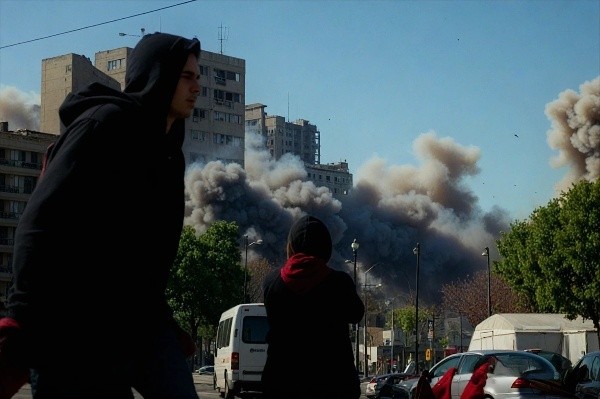Iran’s Plan to Strike Back Against the U.S.
Iran’s Military Preparations Following U.S. Attacks
Loading...

Israeli air strikes flattened five buildings in the Lebanese capital Beirut’s southern suburbs.
Air Strikes Devastate Beirut
In a significant escalation of military action, Israeli air strikes have targeted the southern suburbs of Beirut for the fourth consecutive day, resulting in the destruction of five buildings, including one near the bustling Tayouneh junction. The Israeli military has stated that these operations aim to dismantle infrastructure utilized by Hezbollah, including munitions warehouses and command centers. The ongoing air raids have raised concerns about the humanitarian impact, as they have forced over one million Lebanese to flee their homes, exacerbating an already dire situation.
Al Jazeera's correspondent in Beirut, Zeina Khodr, reported that the Israeli military issued two forced evacuation orders prior to the strikes. Many residents, compelled to leave their homes, now face uncertainty about their future. Khodr noted that while there have been no reported casualties due to these evacuations, human rights organizations have criticized the lack of adequate time provided for residents to escape the impending danger.
Hezbollah's Response
In retaliation, Hezbollah has launched rocket attacks against Israeli military positions in northern Israel, specifically targeting soldiers in Misgav Am and the Yiftah barracks. The Lebanese group has claimed responsibility for multiple strikes, asserting its commitment to countering Israeli aggression. Despite the heavy bombardment from Israel, Hezbollah has maintained its operational capabilities, continuing to engage Israeli forces in the region.
The conflict, which has intensified since late September, has seen Israel conducting air strikes in response to ongoing hostilities with Hezbollah, particularly in the context of the broader Gaza war. Israel's military objectives include ensuring the safety of its citizens, many of whom have been evacuated from northern areas due to the threat posed by Hezbollah.
Humanitarian Crisis Unfolds
The relentless air strikes have resulted in a staggering toll, with reports indicating that at least 3,386 people have been killed and over 14,417 wounded in Lebanon since the escalation began in October 2023. The humanitarian crisis is deepening, with many families displaced and essential services disrupted. The international community is increasingly alarmed by the scale of the violence and its implications for regional stability.
Diplomatic Efforts for Ceasefire
Amid the escalating violence, diplomatic efforts are underway to negotiate a ceasefire. Recent reports indicate that the US ambassador to Lebanon has presented a draft ceasefire proposal to Lebanese officials, including Parliament Speaker Nabih Berri, who is backed by Hezbollah. Berri's discussions with senior Iranian official Ali Larijani suggest a potential alignment of interests, as Iran has expressed support for any decisions made by Lebanon regarding the ceasefire.
Larijani emphasized that Iran is not seeking to undermine the US truce plan but rather aims to support Lebanon's sovereignty and stability. He criticized Israeli Prime Minister Benjamin Netanyahu, asserting that the real disruption comes from Israeli actions. The international community has called for a ceasefire based on UN Security Council Resolution 1701, which mandates the disarmament of Hezbollah and the withdrawal of its forces from southern Lebanon.
Conclusion
As the situation in Lebanon remains precarious, the urgent need for a ceasefire becomes increasingly apparent. The ongoing violence not only threatens the lives of countless civilians but also poses a significant challenge to regional peace and security. With diplomatic channels opening, there is cautious optimism that a resolution may be within reach, but the path forward remains fraught with challenges.
Editor
Iran’s Military Preparations Following U.S. Attacks
Troops remain in five strategic locations, raising fears of renewed tensions and long-term occupation.
Opposition forces have taken control of the capital after a significant offensive. Here is how it unravelled.
